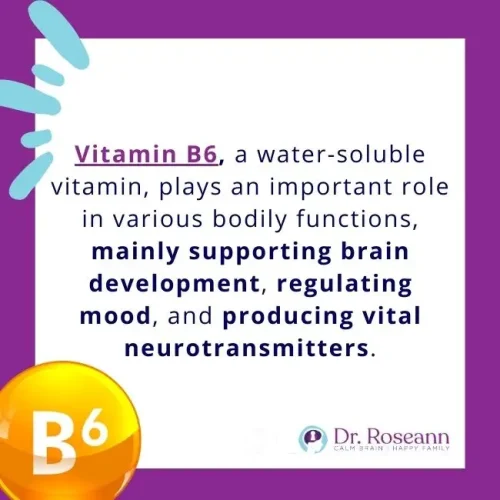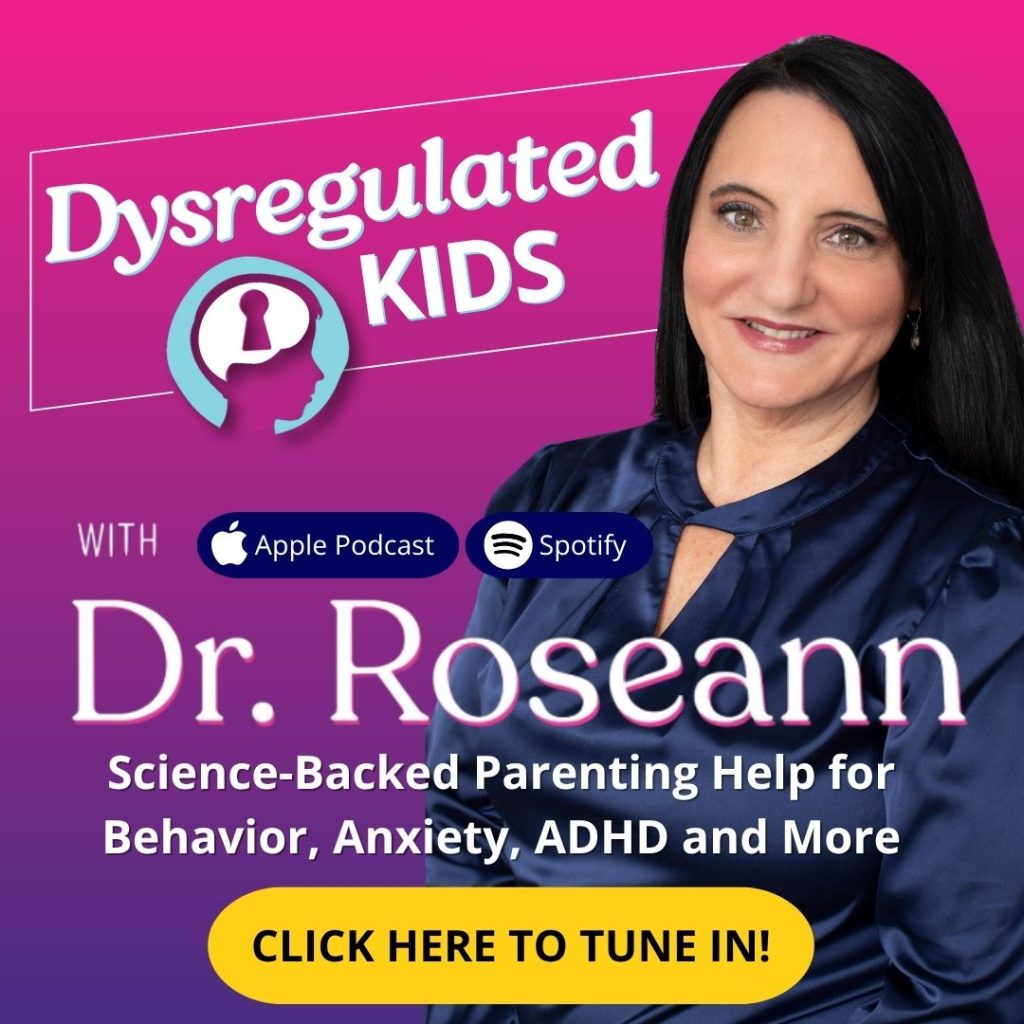Estimated reading time: 6 minutes
When your child’s behavior, focus, or emotions feel unpredictable, it can leave you feeling lost. Sometimes the missing piece is surprisingly simple—like Vitamin B6 and the family of B vitamins that play a powerful role in regulating the brain.
What Role Does Vitamin B6 Play in Mental Health?

Vitamin B6—also called pyridoxine—does more than hide on a nutrition label. Think of it as the electrician wiring your child’s brain, switching on serotonin, dopamine, and GABA.
These chemicals regulate mood, sleep, focus, and stress. Without enough B6, kids may seem cranky, scattered, or anxious. Not misbehavior—just a brain running on fumes.
If your child feels cranky or scattered, it isn’t your fault. Their brain may just be low on the fuel it needs.
B6 also powers:
- red blood cell production
- steady energy
- nervous system stability
Research shows its crucial role in brain balance (Kirksey et al., 1990). That’s a lot of work for one vitamin.
But here’s the truth: B6 doesn’t work alone. The B family runs like a pit crew, each with a task. If one slows down, the whole team struggles.
| B12 (methylcobalamin, adenosylcobalamin) | Protects nerves, sharpens focus, boosts mood and energy |
| B9 (methylfolate) | Builds serotonin and dopamine; better than folic acid for many kids |
| B1 (thiamine) | Fuels memory and concentration |
| B2 (riboflavin-5-phosphate) | Aids mitochondria, detox, and growth |
| B3 (niacin, niacinamide) | Eases stress and supports metabolism |
| B5 (pantothenic acid) | Steadies hormones and adrenal function |
| B7 (biotin) | Strengthens nerve signals and mood balance |
Think of them as teammates. Each has unique strengths, yet the win comes only when all show up.
B vitamins aren’t solo acts—they’re a brain-regulating orchestra. Support them together, especially in methylated forms, and your child’s focus sharpens, mood steadies, and calm returns.
When we regulate the brain first, connection and correction follow—Regulate. Connect. Correct.
What Are the Stages and Signs of Vitamin B6 Deficiency in Mental Health?

B6 deficiency doesn’t usually show up overnight. Parents often notice subtle signs first, which grow into more challenging symptoms if left unaddressed.
Stage 1: Subtle Emotional Shifts
- Irritability
- Trouble falling asleep
- Mild anxiety or worries
Stage 2: Noticeable Behavior and Focus Issues
- Mood swings or meltdowns
- Hyperactivity or low motivation
- Struggles with schoolwork or concentration
Stage 3: Significant Emotional and Physical Impact
- Depression-like symptoms
- Severe anxiety or compulsions
- Fatigue, low immunity, frequent illness
Parent Story
Angela, mom of a 9-year-old with anxiety, noticed her daughter snapping at siblings over tiny frustrations. After testing showed low B6, adding a methylated B complex turned the tide—her daughter became calmer, less anxious, and more engaged at school.
The big takeaway? Small nutrient shifts can create big behavioral changes.
A recent study (Rizzo et al., 2022) found that low B6 disrupts the brain’s balance, leading to runaway activity in the nervous system.
- For kids, that can show up as anxiety, mood struggles, or trouble calming down.
- It’s more proof that when the brain is dysregulated, behavior follows — and why calming the brain first is always step one.
What Mental Health Symptoms Are Linked to B6 Deficiency?
If your child’s meltdowns or worries feel constant, you’re not failing as a parent. Their brain may just be missing the nutrients it needs to stay calm and focused.
When the brain lacks B6, parents often see it in everyday struggles.
Common symptoms in kids and teens
- Sudden irritability or frequent meltdowns
- Anxiety, worry loops, or repetitive thoughts
- Poor sleep or nightmares
- Low focus or brain fog
- Fatigue despite good rest
In teens especially:
- Mood swings
- Withdrawal from friends
- Feelings of sadness or hopelessness
Behavior is communication. Sometimes what looks like “defiance” or “laziness” is actually a brain craving support
How Do Other B Vitamins Affect Mood and Behavior?
B6 often steals the spotlight, yet the full B vitamin crew works side by side calming and steadying the brain. Miss one piece and suddenly focus drops, moods swing, or behavior looks “defiant” when it’s really imbalance showing up.
- B12 (methylcobalamin): When levels dip, kids may seem foggy, low, or forgetful
- B9 (methylfolate): Essential for serotonin and dopamine, especially in children with MTHFR who struggle with folic acid
- B1 & B2: Low intake can appear as fatigue, irritability, or weak concentration
- B3 (niacin): Keeps mood balanced and energy flowing; shortages sometimes lead to agitation or even confusion
Here’s the takeaway:
a balanced methylated B complex often supports kids far better than singles. These nutrients play like a band—when everyone shows up, the music flows. When one instrument is missing, the whole song feels off.
If your child seems foggy or moody, it’s not because they’re lazy—it may simply be their brain missing a key piece of support.
Calm the Brain First, Everything Follows. When we regulate first with the right nutrients, connection and correction naturally follow—Regulate. Connect. Correct.
What Causes Vitamin B6 and B Vitamin Deficiencies in Kids?
Parents often ask: Why would my child even be low in B vitamins?
Common causes:
- Poor diet (processed foods, low protein)
- Genetics (like MTHFR)
- Medications (anticonvulsants, some ADHD meds, birth control)
- Gut issues (poor absorption, microbiome imbalance)
- Chronic stress (burns through nutrients faster)
Parent Story
Mark, dad of a 12-year-old with ADHD, discovered his son’s diet of chicken nuggets and soda left him chronically low in B vitamins. Once they added a B complex and more protein, his son’s focus and mood steadied within weeks. Takeaway: nutrition fuels regulation.
If this list feels overwhelming, you’re not alone—many kids face one or more of these challenges. It doesn’t mean you’ve failed as a parent.
How Can Parents Support Their Child’s B Vitamin Levels Naturally?

1. Nourishing Foods (brain fuel you can use today)
- Poultry & fish → Protein for steady mood and focus
- Eggs → Packed with B vitamins and choline for memory
- Bananas & chickpeas → Simple snacks that lift serotonin
- Spinach & leafy greens → Folate for calm and resilience
- Fruits → Natural antioxidants that protect and fuel the brain
- Fortified cereals → Choose natural over synthetic B vitamins
2. Methylated Supplements (forms kids absorb best)
- Methylcobalamin (B12): Nerves, mood, energy
- Methylfolate (B9): Serotonin and dopamine support, vital with MTHFR
- Pyridoxal-5-phosphate (B6): Active form for mood and sleep
3. Lifestyle Foundations (where calm begins daily)
- Consistent sleep resets the nervous system
- Movement—walking, swinging, stretching—releases stress
- Co-regulation teaches calm when you stay calm
- Breathing, yoga, or music help reset
If this feels like a lot, don’t worry—you don’t have to change everything at once. Even small shifts make a real difference when you start by calming the brain first.
Start small. One shift—a new bedtime, or eggs at breakfast—can calm the brain and spark focus and connection.
When To Talk To A Professional About B Vitamin Deficiency?
- Ongoing anxiety, mood swings, or sleep struggles
- Sudden changes in focus or behavior
- Family history of ADHD, depression, or learning issues
- Lab results showing nutrient gaps
This isn’t bad parenting—it’s a dysregulated brain. When we calm the brain first, connection and correction finally fall into place.
Parent Action Steps
FAQs
What happens if Vitamin B6 deficiency is left untreated?
Untreated B6 deficiency can progress from fatigue and irritability to more serious issues like depression, anxiety, or cognitive decline. Over time, the brain struggles to regulate mood and sleep, leaving kids dysregulated and overwhelmed.
Are mood swings a sign of Vitamin B6 deficiency?
They can be. Mood swings often reflect imbalances in neurotransmitters. Without enough B6, serotonin and dopamine levels drop, which can cause kids to go from calm to irritable quickly. Supporting B6 helps restore balance.
What are advanced signs of Vitamin B6 deficiency?
In advanced stages, kids may show severe mood changes, confusion, numbness, or even seizures. While rare, these symptoms highlight how essential B6 is for brain and nervous system function. Early support prevents progression.
How does Vitamin B6 support sleep and focus?
B6 helps the brain make melatonin and neurotransmitters that regulate sleep and attention. Deficiency can show up as restless nights, poor focus, or brain fog. With healthy levels, kids often feel calmer, sleep better, and concentrate more easily.
Citations
Kirksey, A., Morre, D. M., & Wasynczuk, A. Z. (1990). Neuronal Development in Vitamin B6Deficiency. Annals of the New York Academy of Sciences, 585(1 Vitamin B6), 202–218. https://doi.org/10.1111/j.1749-6632.1990.tb28054.x
Rizzo, R., Prato, A., Scerbo, M., Saia, F., Barone, R., & Curatolo, P. (2022). Use of Nutritional Supplements Based on L-Theanine and Vitamin B6 in Children with Tourette Syndrome, with Anxiety Disorders: A Pilot Study. Nutrients, 14(4), 852. https://doi.org/10.3390/nu14040852
Always remember… “Calm Brain, Happy Family™”
Are you looking for SOLUTIONS for your struggling child or teen?
Dr. Roseann and her team are all about science-backed solutions, so you are in the right place!










